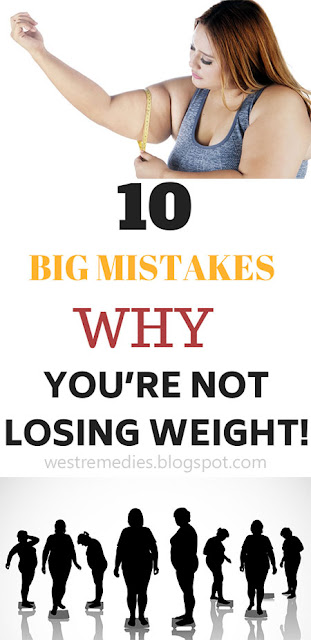It is true that diet and exercise are the keys to slimming down and maintaining a balanced weight. What is not so certain, however, is whether these are the only things you need to achieve your ideal weight, since according to research there are other external factors that can cause a person to gain weight.
If you are eating a healthy diet and doing regular exercise but you are not losing weight, perhaps one or more of the following reasons may be the cause. Below are 7 possible reasons why you might be having trouble losing weight.
You’re eating too much
If you’ve already cleaned up your diet big time and you’re still not losing weight, it may be that you're simply eating too much. In order to shed pounds your body needs to run a calorie deficit, meaning you need to burn more than you consume. That being said, you shouldn’t have to deprive yourself either. Life is about balance. Don’t become consumed with counting calories or weighing yourself every day.
You could have a medical issue.
Some health problems can prevent weight loss or cause weight gain. Consult your physician if you are concerned about any of the following health conditions: Hypothyroidism, insulin resistance, chronic stress, Cushing’s syndrome, polycystic ovarian syndrome (PCOS), depression, leaky gut or adrenal fatigue.
You're not working hard enough
There's no exact equation to working out and eating healthy—it’s a matter of trial and error, finding out what works specifically for your body. And more time spent in the gym doesn't always equal a more fit person. Unless you’re an athlete, body builder, or a marathoner-in-training, the average person shouldn't be working out more than an hour a day.
Your workouts should be intensity-dependent, not time dependent. Keep this fact in mind: the harder you work, the shorter your workout time may need to be. That’s why it's so important to maximize your time spent in the gym or fitness class so you can achieve that coveted ‘afterburn’ effect which keeps your metabolism revved for 24-48 hours afterward.
YOU’RE NOT GETTING ENOUGH SLEEP
Studies have shown that people who have trouble sleeping or sleep less than five hours a night have a slower metabolism and this affects their hunger hormones such as leptin and ghrelin.Leptin is the hormone that tells the brain when to stop eating, while ghrelin (produced in the stomach) stimulates hunger. According to studies, people who do not sleep well have a low level of leptin and high levels of ghrelin. This means that they tend to eat more and gain more weight.
To solve this problem, the recommendation is to have a good sleep routine with at least 8 hours of rest every day.
YOU’RE CONSUMING HIDDEN SUGARS
Hidden sugars can be present even where you least expect them; without even knowing it you are consuming considerable amounts through energy bars, cereals, sports drinks, sauces and spreads.To avoid this, it is very important that you read the label well before buying a product and avoid those containing refined sugars.
YOU COUNT CALORIES BUT NOT NUTRIENTS
Obviously when we want to lose weight, we should eat smaller portions and cut down on our calorie intake. However, some people become so obsessed with this detail that they forget there are very important nutrients that should be included in one’s diet.In this case, the most important thing is to think about the quality of the foods you’re eating – rather than just calories – making sure you’re getting a good number of vitamins, minerals and antioxidants.
YOU SPEND A LOT OF TIME SITTING
A sedentary lifestyle is one of the major causes of obesity and being overweight. Many times you may think there is no time to exercise, but in reality there is a lack of interest. It is recommended to do at least 30 minutes of exercise every day, such as walking, running, jogging, cycling, among others.YOU DON’T TAKE THE NECESSARY TIME TO COOK
The combination of a sedentary lifestyle along with a poor diet is one of the worst enemies of maintaining an ideal weight. Due to a lack of time, many choose to consume frozen foods, fast food or a combination of junk food. The solution is to start taking more time each week to prepare a healthy meal and especially to prepare a good breakfast.YOU ARE DEALING WITH A HORMONAL PROBLEM
Sometimes you have tried everything to lose weight but instead you keep gaining. In this case, it is recommended that you consult with your doctor, since weight gain could be the result of a hormonal disorder, such as hyperthyroidism, polycystic ovary syndrome and insulin resistance.After consulting with your doctor, he or she can tell you the treatment to follow in order to improve this condition. Furthermore, if it is confirmed that the problem is a hormonal condition, it is good to begin including in your diet healthy protein, vegetables, seaweed and essential fatty acids.
YOU’RE NOT CONSUMING SIGNIFICANT PORTIONS OF ESSENTIAL FATTY ACIDS
Omega 3 and 6 fatty acids are found in high concentrations in fish.For many years, nutritional plans and weight loss diets made fats our enemies. Today there are many “low-fat” products that promise better nutrition, but despite this, the rates of obesity and being overweight continue rising.
The mistake you can make when it comes to losing weight is not including in enough healthy fats your diet, such as fatty acids which are in flax seed oil, fish oil, nuts and seeds. These types of fats help break down the bad fats in the body, at the same time providing a feeling of satisfaction.
Loading...










